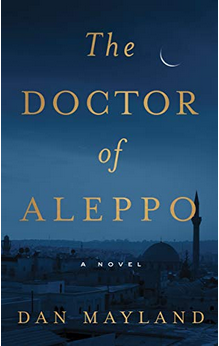Book Review: The Doctor of Aleppo
The Doctor of Aleppo, Dan Mayland, Black Stone Publishing

Dan Mayland is known for his Mark Sava spy series, which is focused in Azerbaijan and other Caspian and Middle Eastern regions that are often only names with fuzzy associations for the American reader. Mayland’s personal experience is steeped in these regions — Georgia, Bahrain — as well as Iran, Turkey, and Syria, whose conflicts many Americans realize they should know more about, but typically don’t.
With The Doctor of Aleppo, Mayland takes a break from globe-trotting spy thrillers to bring us a deeply humane, closely observed view into the unspooling of Syria from civil unrest into protracted civil war. Fans of Elliot Ackerman’s similarly compelling stories of the human cost of Middle Eastern conflicts — in this case, Dark at the Crossing in particular — will discover a kindred spirit here.
Syria was one of several countries involved in the 2011 Arab Spring, but the brutal regime of Bashar al-Assad proved more resilient than others that collapsed, such as Mubarak’s Egypt. The Free Syrian Army formed from the uprising, but the war offered an opening to ISIS, which also sought to overthrow Assad but with the intent to found a fundamentalist Islamic state. Civilians were squeezed between the regime and the jihadis; both sides demanded loyalty or blood.
The story takes place over a four-year period. By starting with Aleppo’s mounting anti-Assad demonstrations that quickly drag the city into the war, Mayland is able to bring his readers along in understanding the evolving, multilayered nature of the conflict, and the human toll it exacts.
The story is told primarily through the viewpoints of Dr. Samir (Sami) Hasan, the talented, brusque orthopedic surgeon of the title, and young Syrian-American Hannah Johnson, who is working with an international aid group on infrastructure projects in the country. Their paths cross when Hannah’s boyfriend Oskar is badly hurt following one of the protests, and Sami operates on him.
Rahim Suleiman, working for Assad’s Mukhabarat intelligence and security apparatus, supplies the third significant voice of the story. His teenage son Adel is the target of an intentional hit-and-run; after Sami successfully operates on him, Adel dies, apparently after an accidental mix-up in antibiotics.
As the city erupts into a battleground, Rahim’s vendetta against Sami ratchets up the danger and makes it personal for the doctor and his family — wife Tahira, children Adam and Noora, his mother and a host of in-laws — forcing Sami to throw in his lot with the Free Syrian Army.
For her part, Hannah is left behind in the city, abandoned by an unfaithful Oskar and left to walk to the Turkish border. Still, over time, she continues to return, helping aid organizations to bring medical supplies to the Free Syrian forces. “The common thread had always been that Hannah felt needed.” Eventually, she finds herself back in Aleppo, where she and Sami meet again and Rahim’s dogged search targets both of them.
Mayland weaves a compelling story, the threads of which continue to tighten as the war drags on, ISIS takes more control, and the Free Syrian Army splinters into fragments. The author’s descriptions offer the richly rendered, telling details of lived experience — or at least of first-hand accounts of a beautiful, ancient city being torn apart, and the savagery of a regime that habitually targets hospitals and clinics, caring nothing for civilian casualties.
“In the Sukkari district, the al Quds hospital was hit, killing the last pediatrician. Newborns choked on dust. White phosphorus from incendiary munitions burned deep holes in flesh . . . The Russians began using cluster bombs, and Rahim helped generate the target lists for those bombs.”
The destruction marches ever closer to the sanctuary Sami has made for his family in a beautiful old fortress-like home built four hundred years before. “It had survived earthquakes, the fall of the Ottoman Empire, the French occupation, World Wars I and II, the push for independence from France, and the war with Israel.”
The question that pulls us forward to the end is what — or who — will survive the brutal conflict. It is clearly certain that no one will emerge unscathed.
Jennifer Bort Yacovissi
Jenny Yacovissi grew up in Bethesda, Maryland, just a bit farther up the hill from Washington, D.C. Her debut novel Up the Hill to Home is a fictionalized account of her mother’s family in Washington from the Civil War to the Great Depression. In addition to writing historical and contemporary literary fiction, Jenny reviews regularly for the Washington Independent Review of Books and the Historical Novel Society. She belongs to the National Book Critic’s Circle and PEN/America. She also owns a small project management and engineering consulting firm, and enjoys gardening and being on the water. Jenny lives with her husband Jim in Crownsville, Maryland. To learn more about the families in Up the Hill to Home and see photos and artifacts from their lives, visit http://www.jbyacovissi.com/about-the-book.
- Web |
- More Posts(33)